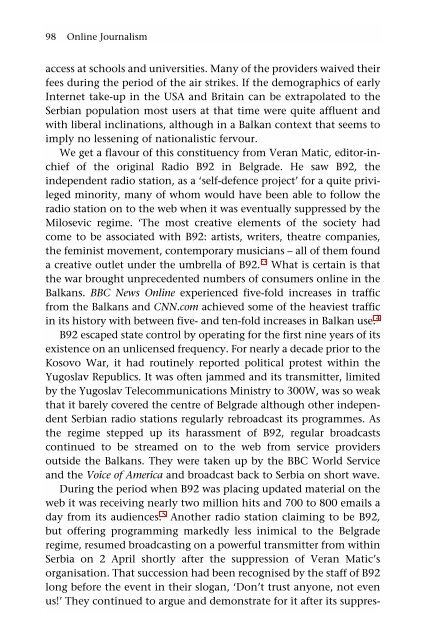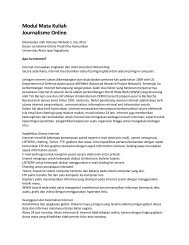Online Journalism - Ayo Menulis FISIP UAJY
Online Journalism - Ayo Menulis FISIP UAJY
Online Journalism - Ayo Menulis FISIP UAJY
Create successful ePaper yourself
Turn your PDF publications into a flip-book with our unique Google optimized e-Paper software.
98 <strong>Online</strong> <strong>Journalism</strong><br />
access at schools and universities. Many of the providers waived their<br />
fees during the period of the air strikes. If the demographics of early<br />
Internet take-up in the USA and Britain can be extrapolated to the<br />
Serbian population most users at that time were quite affluent and<br />
with liberal inclinations, although in a Balkan context that seems to<br />
imply no lessening of nationalistic fervour.<br />
We get a flavour of this constituency from Veran Matic, editor-inchief<br />
of the original Radio B92 in Belgrade. He saw B92, the<br />
independent radio station, as a ‘self-defence project’ for a quite privileged<br />
minority, many of whom would have been able to follow the<br />
radio station on to the web when it was eventually suppressed by the<br />
Milosevic regime. ‘The most creative elements of the society had<br />
come to be associated with B92: artists, writers, theatre companies,<br />
the feminist movement, contemporary musicians – all of them found<br />
a creative outlet under the umbrella of B92.’ 3 What is certain is that<br />
the war brought unprecedented numbers of consumers online in the<br />
Balkans. BBC News <strong>Online</strong> experienced five-fold increases in traffic<br />
from the Balkans and CNN.com achieved some of the heaviest traffic<br />
in its history with between five- and ten-fold increases in Balkan use. 4<br />
B92 escaped state control by operating for the first nine years of its<br />
existence on an unlicensed frequency. For nearly a decade prior to the<br />
Kosovo War, it had routinely reported political protest within the<br />
Yugoslav Republics. It was often jammed and its transmitter, limited<br />
by the Yugoslav Telecommunications Ministry to 300W, was so weak<br />
that it barely covered the centre of Belgrade although other independent<br />
Serbian radio stations regularly rebroadcast its programmes. As<br />
the regime stepped up its harassment of B92, regular broadcasts<br />
continued to be streamed on to the web from service providers<br />
outside the Balkans. They were taken up by the BBC World Service<br />
and the Voice of America and broadcast back to Serbia on short wave.<br />
During the period when B92 was placing updated material on the<br />
web it was receiving nearly two million hits and 700 to 800 emails a<br />
day from its audiences. 5 Another radio station claiming to be B92,<br />
but offering programming markedly less inimical to the Belgrade<br />
regime, resumed broadcasting on a powerful transmitter from within<br />
Serbia on 2 April shortly after the suppression of Veran Matic’s<br />
organisation. That succession had been recognised by the staff of B92<br />
long before the event in their slogan, ‘Don’t trust anyone, not even<br />
us!’ They continued to argue and demonstrate for it after its suppres-
















